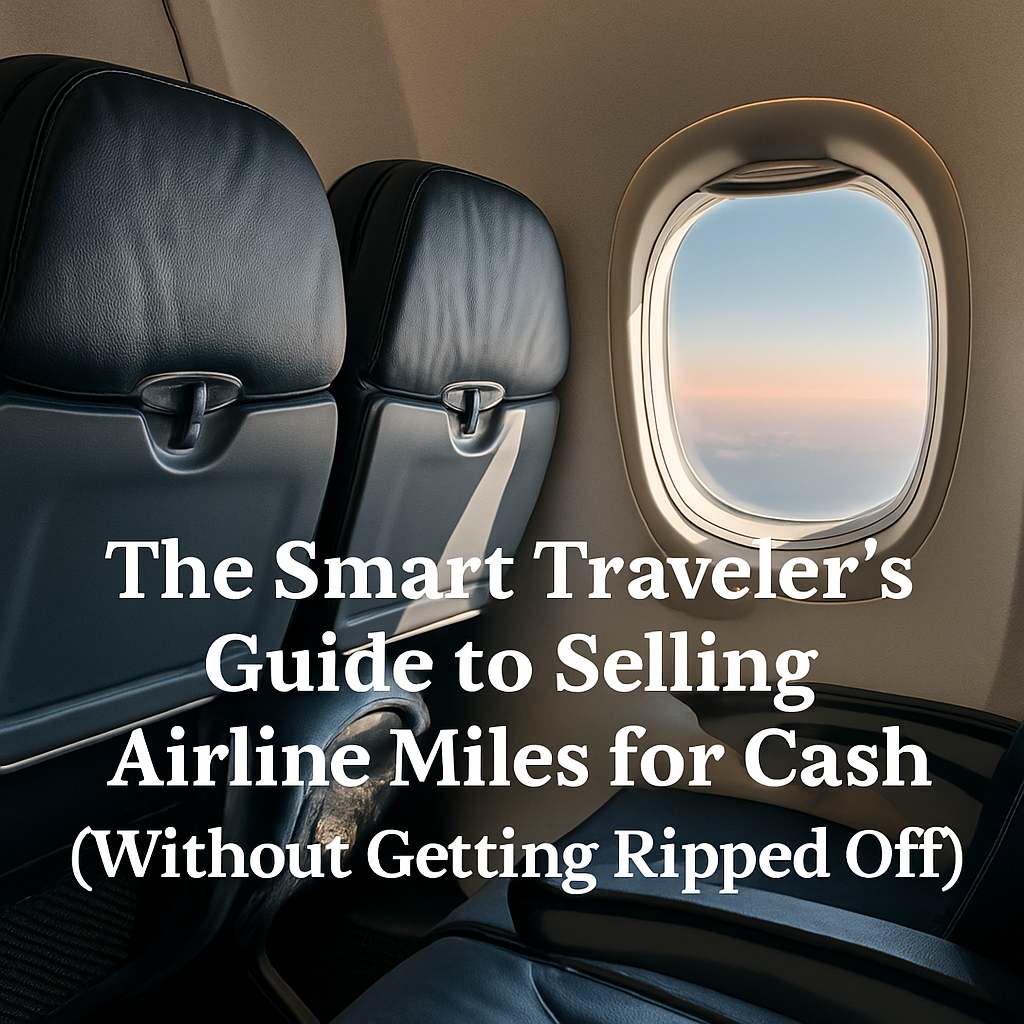Sell Your Air France Miles: Why You Might Want to Do It Before 2026

by admin
If you’re sitting on a stash of Air France / KLM Flying Blue miles and haven’t found a use for them yet, you might be considering selling them. Selling airline miles is a gray area — it’s typically against the airline’s terms, but there is a secondary market that facilitates such trades. The question many frequent flyers ask is: “Is it risky? And do I need to hurry?”
There’s growing chatter in the mileage / points community that changes may be coming in 2026 — making now a potentially better time to convert your miles into cash rather than wait. In this piece, we’ll explore the latest news, the rationale behind selling now vs later, and answer the most common questions people have.
The Latest Developments in Flying Blue / Air France Mileage
Here are some recent trends and news items relevant for anyone thinking of selling miles:
- Reduced award rates on Delta flights in 2026
Flying Blue has slashed redemption rates for many Delta-operated economy flights in 2026 by ~20–30%. For example, a route that cost 8,000 miles in 2025 might cost only 5,500 miles in 2026. While this may seem like good news for redeemers, it also reflects how volatile award pricing can be, which introduces uncertainty in valuing miles long-term. - Mixed pricing changes on Air France / KLM routes
While partner (Delta) awards are seeing cuts for 2026, Air France / KLM’s own award pricing has undergone changes in 2025, possibly raising “starting at” levels for many routes. (For example, Flying Blue’s “starting at” prices for transatlantic routes were updated in early 2025.)
Also, from community forums:“ALL business tickets jump with 50% or more up. Especially in 2026 — literally ALL flights are fixed at this higher redemption rates.” This suggests that for certain routes, particularly premium cabins, devaluation may already be baked in for the 2026 calendar. - Promotions and shifting award discounts are often short-term
Flying Blue continues to offer Promo Rewards — monthly discounted award opportunities — which can reduce required miles by 25–50% on select routes. But these are limited in scope and often only apply to specific routes and timeframes. - Active brokers buying Air France miles
Several brokers and marketplaces advertise that they will purchase Flying Blue miles for cash (or equivalent value). These services quote you a rate, you transfer or commit your miles, and you receive payment (often via PayPal or bank transfer).However, note: selling miles typically violates the airline’s terms of service, and accounts could be penalized (e.g. miles canceled, account suspended). The workaround is that many brokers ask you to transfer the miles as if booking a ticket (or use an intermediate account), not as a direct “sale of miles.” But it remains a risk.
Why Sell Before 2026? (Or At Least Before Big Changes Hit)
Here are key arguments for why you may want to act sooner rather than later:
-
Uncertainty in Award Pricing & Devaluations
As we already see, award pricing changes are underway (especially for 2026). If more routes get devalued (i.e. require more miles), the value of your existing miles might drop. If you don’t lock in a sale now, you risk being stuck with miles that have lower dollar-per-mile value in the future. -
Limits or restrictions could tighten further
Airlines frequently update their loyalty program rules — for example, restrictions on transfers, expiration policy, or third-party sales. If Flying Blue becomes more aggressive about policing or penalizing miles transfers or sales, your ability to monetize miles later might become harder or more risky. -
Cash now vs speculative value later
If you don’t have an immediate redemption in mind, converting miles now for cash allows you to use that money freely (invest, spend, or reinvest). Waiting for a “better redemption” is speculative — there’s no guarantee that the value of a mile will improve. -
Expiration / inactivity risk
Many loyalty programs enforce expiration due to inactivity. If your account goes dormant, you could lose miles altogether. Converting them now mitigates that risk. -
Window before policy changes take effect
If Air France / Flying Blue were to announce changes that disallow or restrict brokered transfers or resale beyond a certain date (e.g. from 2026 onward), having sold earlier ensures you aren’t blocked by new rules. -
Behavioral momentum
The more brokers see demand now, the more competitive offers they’ll provide. If demand drops later, rates may worsen. Getting in early can get you better rates.
In short: 2026 looks like a tipping point in a lot of the current discussion — for many Flyers, acting before then may allow you to lock in value while options are still more favorable and less restricted.
What to Watch Out For / Risks
Before deciding to sell, be aware of downside:
-
Violation of airline’s terms
As noted, most airlines forbid direct sale of miles. If Flying Blue discovers you sold miles, they might cancel your miles or suspend your account.
Brokers often use “creative” methods (e.g. booking tickets, using intermediary accounts) to mitigate that risk, but it’s not zero. -
Broker reliability & scams
Use only trusted, well-reviewed brokers. Fake marketplaces or shady middlemen may take your miles and never pay. -
Rate fluctuations
The price offered per mile may vary dramatically depending on supply and demand. Don’t assume a fixed rate indefinitely. -
Taxes / reporting
Depending on your country, selling miles might have tax implications (treated as income). Check local laws. -
Timing and delay
The process may not be instantaneous. Payment may come only after the broker has “used” or monetized the miles (which may require you to wait). -
Account health & audit risk
If you frequently engage in selling miles and your Flying Blue account shows odd patterns, the airline might flag your account for review.
Suggested Action Plan (Before 2026)
- Audit your miles balance – See how many miles are truly idle and not tied to an imminent redemption.
- Get quotes from multiple brokers – Compare rates (dollars per mile) and read terms carefully (minimums, fees, transfer method, payout method, reliability).
- Check broker legitimacy – Look for reviews, user testimonials, track record.
- Act with caution – Don’t transfer your entire stash at once until the broker has paid or proven legitimacy.
- Monitor airline policy changes – Watch for Flying Blue / Air France announcements regarding miles policy.
- Consider redeeming partially – If there’s a route you’ll use in 2025 under favorable pricing, redeeming may yield better value than a sale at some rate.
FAQ: Common Questions About Selling Air France / Flying Blue Miles
Below are frequently asked questions (and answers) around selling miles.
| Question | Answer / Notes |
|---|---|
| Is selling Air France / Flying Blue miles legal? | It’s not illegal, but it usually violates the airline’s terms of service. That means the airline could cancel your miles or penalize your account. Brokers try to minimize risk by structuring the transaction in a way that seems like a ticket or transfer. |
| Can I just transfer miles to a buyer? | Direct transfers typically are disallowed or flagged. Brokers often use methods like booking flights for third parties or transferring to intermediate accounts to mask the “sale.” |
| How much are Flying Blue miles worth? | The value depends on what the broker offers and prevailing demand. Some brokers advertise around ~$0.0009 to $0.001 per mile (i.e. under a penny per mile) or better, depending on volume. (These values shift frequently.) |
| Do brokers buy miles close to expiration? | Many brokers avoid buying miles that are expiring soon (e.g. within 6 months), due to the risk of the airline expiring them. |
| How fast is payment? | It depends. Some brokers promise same-day or next-business-day payment (after account verification). Others may delay payment until they have “used” the miles. Always check the broker’s payout terms. |
| Is there a minimum number of miles required? | Yes. Many brokers impose a minimum (e.g. 50,000, 80,000, 100,000 miles) to make a transaction worthwhile. |
| Will selling miles affect my Flying Blue status or account? | Potentially yes. If the airline audits your account and detects suspicious transfers or mileage movements, it might reduce your status, remove benefits, or cancel miles. |
| What are alternative uses aside from selling? | You can redeem for flights, upgrades, hotel or partner redemptions, gift tickets, or transfer miles to family (if allowed). But often these yield lower “liquid” cash value than a sale — especially if you don’t have a use. |
| What about taxes? | In some jurisdictions, cash received from selling miles might count as income, which may need reporting. Consult a tax advisor in your country. |
| Can I “sell” only part of my balance? | Yes, brokers often allow partial sales. It’s safer to test with a smaller transfer first, to confirm the broker’s legitimacy. |
| What if Flying Blue changes rules after I sell? | That is part of the risk. If new rules disallow brokered transfers or penalize them, it could raise costs, reduce rates, or increase risk of reversal. That’s another reason many prefer to act earlier. |
Closing Thoughts
Selling Air France / Flying Blue miles isn’t a universally recommended move — it carries risks, and you should weigh those against your alternatives. But with mounting indications of award devaluations, rule tightening, and unpredictable pricing shifts heading into 2026, there is a persuasive argument for monetizing miles sooner rather than later.
If you like, I can help you compare current broker offers for selling Flying Blue miles and estimate whether selling now is better than redeeming. Would you like me to do that for you?
Recommended Posts

Why You Should Sell Your Qantas Frequent Flyer Miles in 2026
16 Jan 2026 - Frequent Flyer Programs, Sell Air Miles


